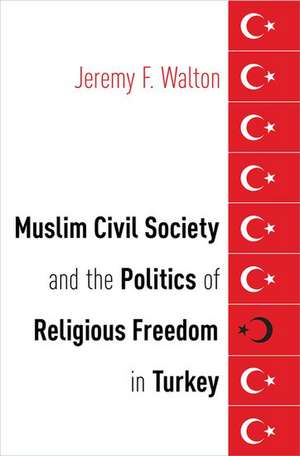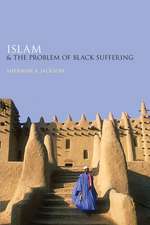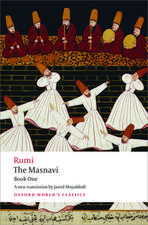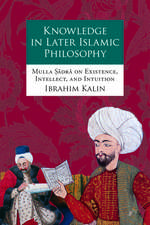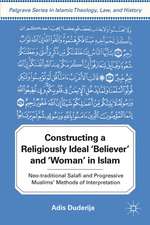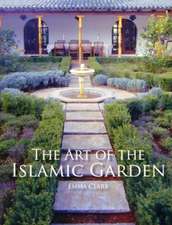Muslim Civil Society and the Politics of Religious Freedom in Turkey: AAR Religion, Culture, and History
Autor Jeremy F. Waltonen Limba Engleză Hardback – 8 iun 2017
Preț: 714.92 lei
Preț vechi: 1027.89 lei
-30% Nou
Puncte Express: 1072
Preț estimativ în valută:
136.80€ • 143.49$ • 113.88£
136.80€ • 143.49$ • 113.88£
Carte disponibilă
Livrare economică 28 februarie-06 martie
Preluare comenzi: 021 569.72.76
Specificații
ISBN-13: 9780190658977
ISBN-10: 0190658975
Pagini: 270
Dimensiuni: 157 x 236 x 25 mm
Greutate: 0.5 kg
Editura: Oxford University Press
Colecția OUP USA
Seria AAR Religion, Culture, and History
Locul publicării:New York, United States
ISBN-10: 0190658975
Pagini: 270
Dimensiuni: 157 x 236 x 25 mm
Greutate: 0.5 kg
Editura: Oxford University Press
Colecția OUP USA
Seria AAR Religion, Culture, and History
Locul publicării:New York, United States
Recenzii
Though Walton's work has greatly assisted me in answering so many unresolved questions and assumptions that arose during my time in Turkey, its contribution goes beyond the benefits of explaining my own experiences back to me; Muslim Civil Society and the Politics of Religious Freedom in Turkish Politics and Society is a valuable piece of scholarship whose nuance towards understanding the religious politics of Islam and the state is often absent in much of the current literature.
The key insight of Walton's study is to show that for a brief period (roughly between 20022009) there was indeed a more liberal space for Muslim civil society actors in Turkey. Walton's study helps shed light on the various manifestations of this development by detailing the mobilization and impact of non-state organizations, conferences, educational facilities, and museums as characterized by differential power dynamics between Turkish society and the Turkish state.
Muslim Civil Society and the Politics of Religious Freedom in Turkey is an informed, highly nuanced account. Weaving together observations from multiple research sites in both urban and rural Turkey, Walton develops a clear argument and makes a timely and informative contribution to the growing literature on religious freedom on the one hand, and the nuanced landscape of Muslim politics in Turkey, on the other hand.
Putting his anthropological experience and language skills to work, Walton has written a book that takes the reader by the hand to enter the corridors of Islamic organisations and streets in Turkey's various geographies. The book pulls together a theoretical framework, which involves anthropology, sociology, political science and history in a comprehendible way... the issue of religion and its multidimensional reflections on politics, society, culture and history of Turkey is an ocean that might easily swallow researchers. With this book, Walton offers a compelling guide to navigate through it ... Therefore, without any doubt, Walton's Muslim Civil Society and the Politics of Religious Freedom in Turkey will be one of the reference guides for researchers who are interested in the interplay between politics and religion in Turkey.
Jeremy Walton's ethnographic exploration of Muslim civil society organizations in Turkey is a welcome contribution to the burgeoning scholarship on the politics of religious freedom, civil religion, and faith-based organizations. While there has been considerable academic interest in public and political forms of Islam in Turkey, a majority of such scholarship has focused on electoral politics or individual religious communities. The heterogeneous field of Muslim civil society, however, remains either unexplored, equated with partisan forms of political Islam, or dismissed as an "opportunity space" for Islamist movements. Muslim Civil Society and the Politics of Religious Freedom in Turkey fills this lacuna by providing an engaging and erudite ethnographic survey of diverse Muslim civil society organizations.
In this perceptive and beautifully written study of the discourses, institutions, and modes of religiosity that shape contemporary mediations of public Islam in Turkey, Jeremy F. Walton guides the reader through a series of excursions into the nongovernmental politics of religious freedom. In the process he describes a civil society effect in which religion is construed as a primordial domain of nonpolitical authenticity in agonistic relation to the state. A path-breaking contribution to the study of the politics of religious freedom. s
With Jeremy F. Walton as an erudite and compelling guide, this book takes its readers on a series of revelatory excursions into Muslim civil society in Turkey. Travelling from the streets of Istanbul to the mountains of eastern Turkey, from the headquarters of foundations to the halls of museums and conferences, Waltons nuanced and sensitive ethnography shimmers with insights and new directions. I can think of no book that engages the heterogeneity of religious civil society and the varieties of public Islam in Turkey with such care and deftness. It will assuredly stand as a major contribution to our understanding of the (non-governmental) politics of religious freedomin Turkey, and well beyond.
Jeremy F. Walton's Muslim Civil Society weaves together ethnographic insight and conceptual erudition in the quest to discern the place of religion in contemporary Turkey. His ethnography of three Muslim civil society networks and their engagement with the conditions of 'liberal governmentality' breaks new ground: It provides an intimate perspective on the actors and processes that shape Turkey's contested modernities and their permanent crises.
The key insight of Walton's study is to show that for a brief period (roughly between 20022009) there was indeed a more liberal space for Muslim civil society actors in Turkey. Walton's study helps shed light on the various manifestations of this development by detailing the mobilization and impact of non-state organizations, conferences, educational facilities, and museums as characterized by differential power dynamics between Turkish society and the Turkish state.
Muslim Civil Society and the Politics of Religious Freedom in Turkey is an informed, highly nuanced account. Weaving together observations from multiple research sites in both urban and rural Turkey, Walton develops a clear argument and makes a timely and informative contribution to the growing literature on religious freedom on the one hand, and the nuanced landscape of Muslim politics in Turkey, on the other hand.
Putting his anthropological experience and language skills to work, Walton has written a book that takes the reader by the hand to enter the corridors of Islamic organisations and streets in Turkey's various geographies. The book pulls together a theoretical framework, which involves anthropology, sociology, political science and history in a comprehendible way... the issue of religion and its multidimensional reflections on politics, society, culture and history of Turkey is an ocean that might easily swallow researchers. With this book, Walton offers a compelling guide to navigate through it ... Therefore, without any doubt, Walton's Muslim Civil Society and the Politics of Religious Freedom in Turkey will be one of the reference guides for researchers who are interested in the interplay between politics and religion in Turkey.
Jeremy Walton's ethnographic exploration of Muslim civil society organizations in Turkey is a welcome contribution to the burgeoning scholarship on the politics of religious freedom, civil religion, and faith-based organizations. While there has been considerable academic interest in public and political forms of Islam in Turkey, a majority of such scholarship has focused on electoral politics or individual religious communities. The heterogeneous field of Muslim civil society, however, remains either unexplored, equated with partisan forms of political Islam, or dismissed as an "opportunity space" for Islamist movements. Muslim Civil Society and the Politics of Religious Freedom in Turkey fills this lacuna by providing an engaging and erudite ethnographic survey of diverse Muslim civil society organizations.
In this perceptive and beautifully written study of the discourses, institutions, and modes of religiosity that shape contemporary mediations of public Islam in Turkey, Jeremy F. Walton guides the reader through a series of excursions into the nongovernmental politics of religious freedom. In the process he describes a civil society effect in which religion is construed as a primordial domain of nonpolitical authenticity in agonistic relation to the state. A path-breaking contribution to the study of the politics of religious freedom. s
With Jeremy F. Walton as an erudite and compelling guide, this book takes its readers on a series of revelatory excursions into Muslim civil society in Turkey. Travelling from the streets of Istanbul to the mountains of eastern Turkey, from the headquarters of foundations to the halls of museums and conferences, Waltons nuanced and sensitive ethnography shimmers with insights and new directions. I can think of no book that engages the heterogeneity of religious civil society and the varieties of public Islam in Turkey with such care and deftness. It will assuredly stand as a major contribution to our understanding of the (non-governmental) politics of religious freedomin Turkey, and well beyond.
Jeremy F. Walton's Muslim Civil Society weaves together ethnographic insight and conceptual erudition in the quest to discern the place of religion in contemporary Turkey. His ethnography of three Muslim civil society networks and their engagement with the conditions of 'liberal governmentality' breaks new ground: It provides an intimate perspective on the actors and processes that shape Turkey's contested modernities and their permanent crises.
Notă biografică
Jeremy F. Walton is a Postdoctoral Fellow for the Study of Secularism and New Religiosities, CETREN Project, Georg August University of Gottingen.
